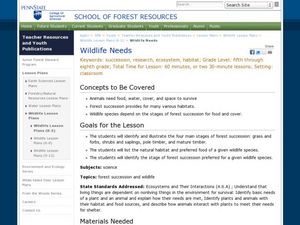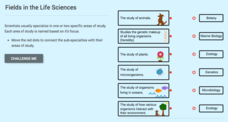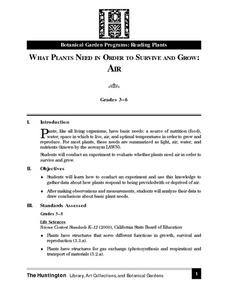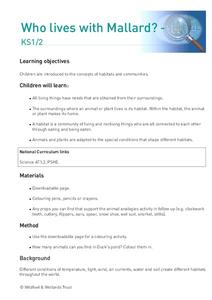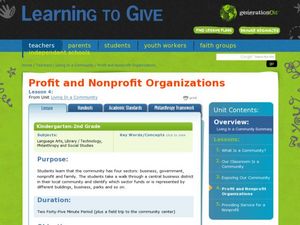Curated OER
Water Snails
Students study water snails. For this water snails lesson, students research the habitats of water snails. After conducting research, students investigate water snails in their habitats and generate scientific observations.
Curated OER
Meet the Plants
Learners examine the difference between living and non-living things. In this living versus non-living lesson, students complete a KWL worksheet and a Living and Non-Living Chart. They examine a variety of plants and non-plants before...
Curated OER
Biology: living Things and their Environment
Middle schoolers recognize that organisms depend on other organisms. In this organism lesson, students understand symbiotic relationships and competition. Middle schoolers explain food chains and food webs. Students understand that...
Curated OER
Wildlife Needs
Students identify the wildlife needs in a specific setting. For this wildlife needs lesson, students identify and illustrate the four stages of forest succession. Students list the natural habitat and food for a given species. Students...
Curated OER
DNA Extraction From Living Things
Students extract DNA from split peas. In this biology lesson, students hypothesize what DNA looks like and perform the experiment to verify their hypothesis. They explain the importance of DNA in living things.
Kentucky School for the Deaf
Levels of Organization within an Ecosystem
From tiny organisms to entire biomes, young scientists examine the interdependent relationships tying all living and non-living things together with this collection of ecology resources.
Ohio National Guard
Emotional Intelligence
Provide teenagers with the social skills they need to live happy lives with this collection of worksheets and activities. Covering a variety of topics from self-awareness and assertiveness, to stress management and problem solving, this...
University of Southern California
Human Impact on the Sea
How far does the human hand reach? Five interactive lessons lead classes through a unit exploring the human impact on ocean resources, pollution, and even extinction. Learners discover how their decisions affect the ocean environment...
Curated OER
Life Systems- Zoo Central
Students investigate the various aspects associated with living things while also concentrating on their basic needs. They explore the aspects of movement and growth in plants and animals. This is done through research and other...
Discovery Education
The Time of Our Life
Mammals are some of the newest organisms to appear on Earth. Young scholars complete an activity that results in a timeline showing the appearance of different types of living organisms. Provided with a list that spans from prokaryotes...
Anglophone School District
Fluids: Force in Fluids
Discuss Archimedes' Principle and fluid forces with your young scientists as they describe the relationship between mass, volume, and density during a series of engaging activities. They use the Participle Theory of Matter to explore the...
CK-12 Foundation
Fields in the Life Sciences
Many fields of study require a specialty and a sub-specialty as you progress through your education. Scholars learn about six sub-specialties of life science. From botany to zoology, our knowledge of the world of living organisms expands...
Curated OER
What Plants Need in Order to Survive and Grow: Air
Students conduct an experiment to determine whether plants need air in order to survive and grow. They discuss natural resources, analyze slides, and observe and record data from the experiment.
Curated OER
What Plants Need in Order to Survive and Grow: Soil
Students conduct an experiment to evaluate whether plants need soil to survive and grow. They plant two seeds, one with soil and one without, make predictions, and record and analyze the seed germination results on a worksheet.
MOST
What Are Cells?
What's in a cell, anyway? Kids read informational text on what makes up both animal and plant cells, including a page of vocabulary terms they will need to be familiar with (cytoplasm, ribosomes, vacuoles, etc.). Full-color images make...
Curated OER
Living and Non-Living
Students discover the basic needs of life. In this science lesson plan, students explore how all living things need air, water, food and shelter
Curated OER
Who lives with Mallard?
Students explore how all living things have needs that are obtained from their surroundings. They identify the surroundings where an animal or plant lives is its habitat. Students identify that a habitat is a community of living and...
Curated OER
Growing Plants
Students explore plants and recognize that they are living things that require light and water to grow. In this online plant biology lesson, students identify, name and match the parts of plants. Extension activities and suggested...
Curated OER
Animal Book
Students explore habitats and the needs of living things. They research a selected animal. Students use KidPix and create a variety of animal riddles. They combine their riddles with those of classmates to create their animal books.
Curated OER
A Walk in the Forest
Students explore interrelationships among plants and animals. Students listen to Where to, Little Wombat? by Charles Fuge, and contribute words and phrases for a classroom animal and plant survival chart. Students take a walk in a...
Curated OER
Special Education Students in the Mainstream Classroom
How to prepare your mainstream students for a special education student in their classroom.
Curated OER
Living in the Community
Students explore the differences between the four sectors of business. In this nonprofit business lesson, students give examples of needs met by businesses and the importance of the community nonprofit sector.
Curated OER
Habitat is Home
Students complete a picture to show things found in their homes. In this habitat lesson plan, students discuss and make a class picture of an animal habitat and its four basic needs. Students sing a song. Students create their own...
Curated OER
Fossils 2: Uncovering the Facts
Students determine what types of information can be determined by looking at fossils. In this fossil lesson, students examine facts about and images of the Tyrannosaurus Rex at an assigned web site. They apply their knowledge to develop...





